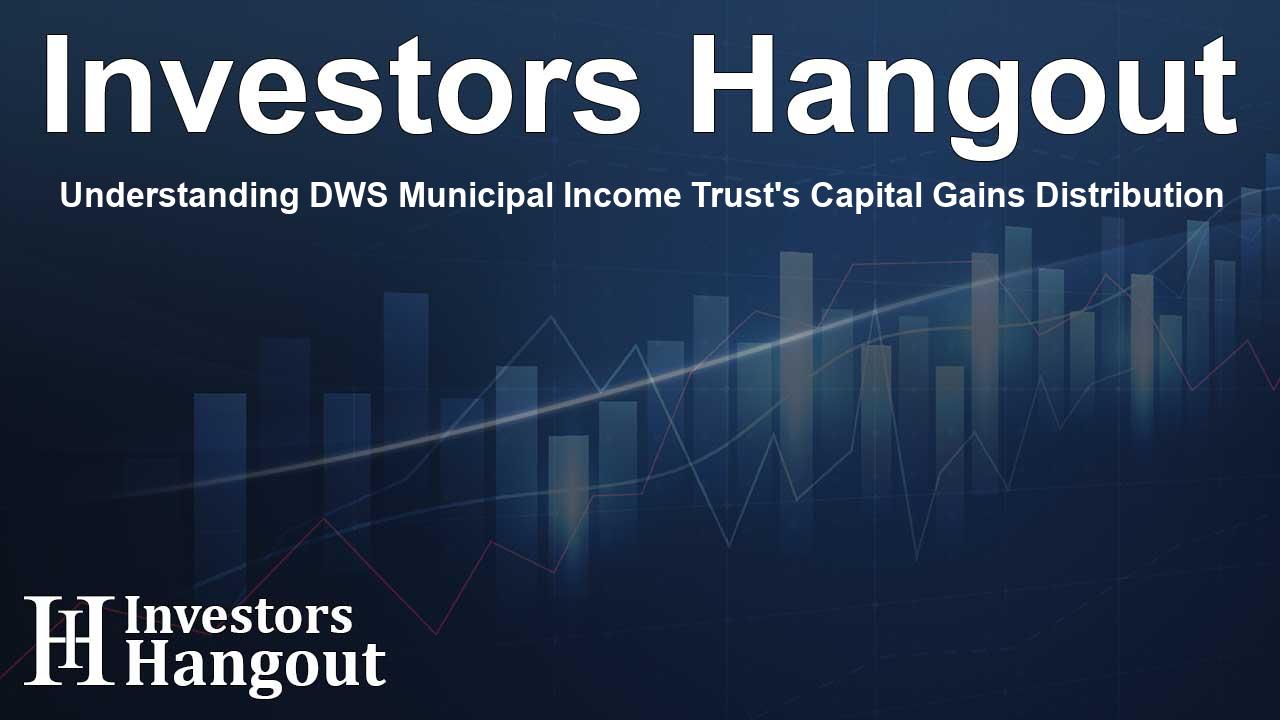Understanding DWS Municipal Income Trust's Capital Gains Distribution

DWS Municipal Income Trust Announces Capital Gain Distribution
DWS Municipal Income Trust has recently made a notable announcement regarding its capital gain distribution strategy. This decision aims to keep investors informed about the financial aspects of their investments, particularly in light of the ongoing changes within the market. Understanding the implications of this announcement can help investors navigate their choices more effectively.
Details of the Capital Gain Distribution
In addition to its regular monthly distribution, the Trust has declared a taxable short-term capital gain distribution per common share. This distribution is particularly significant because it affects both common and preferred shares that are currently outstanding. The Trust is obligated to allocate a proportionate share of distributions designated as taxable in accordance with IRS regulations, impacting both categories of shareholders.
Key Dates to Remember
The capital gain distribution comes with essential dates that investors should mark on their calendars:
- Declaration Date: Announced on December 18, 2024.
- Ex-Date: Set for December 30, 2024, which marks the cut-off for eligible shareholders.
- Record Date: Also on December 30, 2024, confirming ownership status for distribution.
- Payment Date: Payable to shareholders on January 10, 2025.
Fund Information
The DWS Municipal Income Trust is known for its steady investment approach, focusing on income generation through municipal bonds. Here’s some key information about the fund:
- Fund Name: DWS Municipal Income Trust
- Ticker Symbol: KTF
- Short-Term Capital Gain (per common share): $0.0156
Important Information to Consider
Investing in municipal bonds, like those held by DWS Municipal Income Trust, carries specific risks. These risks include interest-rate fluctuations, credit risks, liquidity issues, and potential market instabilities. As interest rates climb, bond prices generally decline, which is a vital consideration for investors. Moreover, credit risk reflects the issuer's capacity to fulfill timely payments of principal and interest, emphasizing the importance of due diligence.
Understanding Closed-End Funds
Investors should also be aware that closed-end funds, such as the DWS Municipal Income Trust, differ significantly from open-end funds. Closed-end funds do not continuously offer shares; instead, there is a fixed public offering and trading occurs in the market. It’s crucial to recognize that closed-end fund shares often trade at a discount to their net asset value, influenced by various market factors. The fund cannot guarantee how or where its shares will trade relative to their net asset value.
Investment Insights
When considering investment opportunities, particularly in the realm of municipal bonds through DWS Municipal Income Trust, keep in mind that past performances do not guarantee future outcomes. Various factors, including economic conditions and regulatory changes, can significantly alter investment landscapes. This principle is especially pertinent given the current dynamic environment affecting economies globally.
The Broader Impact
Moreover, factors such as geopolitical events, public health crises, and economic sanctions can lead to market disruptions that impact investor confidence. These elements can evoke significant volatility across U.S. and global markets, potentially affecting the Fund's investments and overall performance. As such, maintaining a well-rounded perspective on market conditions is essential for navigating investment decisions.
Frequently Asked Questions
What is the purpose of capital gain distributions?
Capital gain distributions are intended to provide shareholders with a portion of the earnings that the fund has realized from the sale of securities.
How does the distribution impact common and preferred shareholders?
The distribution will affect both common and preferred shareholders as it is allocated proportionately according to IRS regulations.
When will the capital gain distribution be paid out?
The capital gain distribution is scheduled to be paid on January 10, 2025.
What are the risks associated with investing in municipal bonds?
Investing in municipal bonds comes with risks such as interest-rate risk, credit risk, and market risk that can impact the bond’s value.
Why should investors consider DWS Municipal Income Trust?
Investors might consider DWS Municipal Income Trust for its focus on municipal bonds that can offer tax-exempt income, although potential risks must be analyzed.
About Investors Hangout
Investors Hangout is a leading online stock forum for financial discussion and learning, offering a wide range of free tools and resources. It draws in traders of all levels, who exchange market knowledge, investigate trading tactics, and keep an eye on industry developments in real time. Featuring financial articles, stock message boards, quotes, charts, company profiles, and live news updates. Through cooperative learning and a wealth of informational resources, it helps users from novices creating their first portfolios to experts honing their techniques. Join Investors Hangout today: https://investorshangout.com/
Disclaimer: The content of this article is solely for general informational purposes only; it does not represent legal, financial, or investment advice. Investors Hangout does not offer financial advice; the author is not a licensed financial advisor. Consult a qualified advisor before making any financial or investment decisions based on this article. The author's interpretation of publicly available data shapes the opinions presented here; as a result, they should not be taken as advice to purchase, sell, or hold any securities mentioned or any other investments. The author does not guarantee the accuracy, completeness, or timeliness of any material, providing it "as is." Information and market conditions may change; past performance is not indicative of future outcomes. If any of the material offered here is inaccurate, please contact us for corrections.